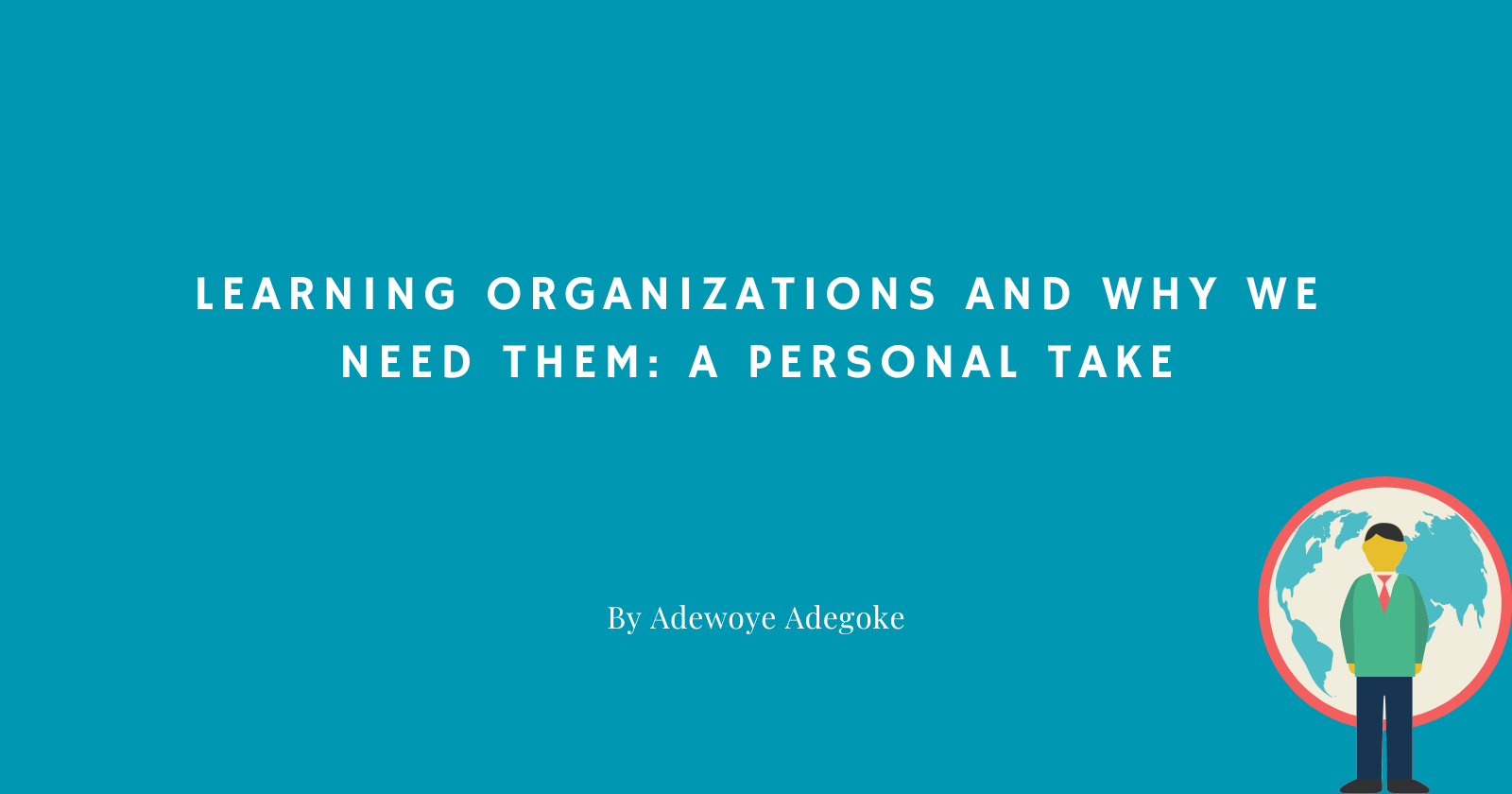Learning Organizations and Why We Need Them: A Personal Take
 Adewoye Adegoke
Adewoye Adegoke
Introduction
In today's fast-paced world, I believe it's more important than ever for organizations to adapt and grow. in my professional journey, I have witnessed the power of learning organizations in unlocking potential and fostering a culture of continuous improvement, knowledge sharing, and adaptability to change. in this article, I will share my personal experiences, and thoughts on learning organizations, and discuss how they can address the challenges faced by some current organizations.
Understanding Learning Organizations
In a 1993 article, Harvard Business School professor David Garvin defined a learning organization as “an organization skilled at creating, acquiring, and transferring knowledge, and at modifying its behavior to reflect new knowledge and insights.
A learning organization in my view is like a living breathing entity that continuously grows and evolves. I have experienced firsthand how organizations that employ the principles of learning organizations seek out new knowledge, share insights, and apply lessons learned to improve their performance and adapt to change. I've identified a few key characteristics of these organizations:
A supportive learning environment that feels like a safe place for open communication, diverse perspectives, and personal growth. I have experienced this in the form of regular team-building exercises and brainstorming sessions that allows employees to contribute and learn from each other.
Concrete learning processes and practices that ensures everyone has the chance to develop and grow both personally and professionally. In my experience being provided with training programs, mentorship opportunities, and access to industry conferences facilitates this.
A Leadership that reinforces learning by setting an example, providing guidance, and supporting employees through their learning journey. I felt supported in my growth and developed at an impressive pace by having a manager that constantly encouraged me to pursue new skills and knowledge, while also providing constructive feedback on my work.
A culture of psychological safety where it's okay to take risks, share ideas and learn from mistakes. I remember our team experimenting with new technology for a project and failing. but we learned valuable lessons that brought about success in future projects
Knowledge sharing and collaboration as a way of life, both within the organization and with external partners. We frequently collaborated with other startups sharing best practices and learning from each other's experiences.
Challenges in Current Organizations
I have also seen firsthand how some organizations struggle to grow and succeed. A few common issues I've observed include:
Inadequate employee training and development: A trend I've noticed in some of my previous roles is little investment in employee skill development, leaving the workforce ill-equipped to tackle the challenges of a rapidly changing business landscape.
Resistance to change: The organizations clung to rigid structures and cultures making it difficult for us to adapt and innovate in response to market demands and technological advancements
Poor leadership: Unfortunately the leadership of these organizations failed to inspire, support, or create a conducive environment for learning and development
Limited Knowledge sharing: A lack of collaboration and knowledge sharing among employees and departments led to siloed thinking, reduced innovation, and inefficient decision-making
How Learning Organizations Can Address These Challenges
I am convinced that by embracing the principles of learning organizations, organizations can overcome these challenges and drive sustainable growth. Based on my professional experience, I envision this transformation:
investing in employee training and development: organizations should prioritize nurturing their employees' skills ensuring a more competent and adaptable workforce capable of navigating market demands and technological changes.
Embracing change and innovation: By fostering a culture of continuous learning and experimentation organizations can stay ahead of the curve and proactively adapt to shifting market dynamics
Developing effective leadership: organizations should understand the critical role of leadership in reinforcing learning and creating an environment where employees feel supported in their growth and development
Encouraging knowledge sharing and collaboration: By Promoting a culture of open communication, collaboration, and knowledge sharing, organizations can break down silos, foster innovation and improve decision making
Conclusion
Reflecting on my own experiences in organizations that follow the principles of learning organizations and organizations that don't, I see the immense benefits that come with investing in employee development, fostering a culture of continuous learning and innovation, developing effective leadership, and promoting knowledge sharing and collaboration. By embracing these principles, I am confident that organizations can adapt to the rapidly changing business environment and sustain development.
To learn more about learning organizations read the Havard business review article Is Yours a learning organization by David A. Garvin, Amy C. Edmondson, and Francesca Gino.
Subscribe to my newsletter
Read articles from Adewoye Adegoke directly inside your inbox. Subscribe to the newsletter, and don't miss out.
Written by

Adewoye Adegoke
Adewoye Adegoke
Product Engineer, Creative Entrepreneur